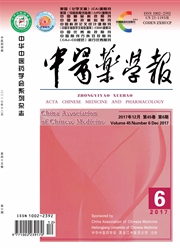

 中文摘要:
中文摘要:
目的:分析携带基因突变和未携带基因突变的特发性扩张型心肌病(IDCM)患者的临床发病及预后的差异性。方法:收集2011年01月-2014年09月于南京鼓楼医院就诊的IDCM患者115例,经靶向二代测序鉴定后分为基因突变组和未突变组,出院后对两组患者进行定期随访,将两组患者的临床资料及随访结果进行统计学分析。结果:两组患者的一般临床特征(如性别比例、首发症状年龄、血压、糖尿病比例等)无显著差异(P〉0.05);辅助检查特征(如左室射血分数、左室舒张末内径、室壁厚度、QRS-T夹角和血肌酐水平等)无显著差异(P〉0.05);治疗情况(如药物和器械治疗)无差异(P〉0.05);随访资料(如再入院和生存分析)亦无统计学差异(P〉0.05,Log rank P=0.12);将性别比例、是否吸烟、是否合并糖尿病、是否植入器械、是否发生突变等临床参数进行Cox回归分析,发现上述参数未影响患者的临床预后(P〉0.05)。结论:本组资料显示携带基因突变的IDCM患者临床发病及预后较未携带突变者无显著差异。
 英文摘要:
英文摘要:
Objective: Analyze the difference of clinical onset and prognosis in patients with idiopathic dilated cardiomyopathy with or without gene mutations. Methods: A total of 115 IDCM patients were enrolled from January 2011 to September 2014. All patients were subjected to targeted next-generation sequencing to identify whether a pathological mutation existed. These IDCM patients were divided into 2 groups: the mutant group and non-mutant group. All patients were followed up with telephone contact. The clinical data and end points were compared. Results: Comparisons between these two groups showed no significant difference in baseline characteristics such as gender, age of symptom onset, blood pressure, and diabetes; assistant examination data such as left ventricular ejection fraction(LVEF), left ventricular diastolic diameters(LVDD), QRS-T angles and serum creatinine level; pharmacotherapy and device implantation; and prognosis including re-hospitalization and all-cause mortality. Factors, such as gender, smoking, diabetes, device implantation and mutation, were analyzed by the method of Cox Regression Analysis. It showed that these factors did not influence their prognosis.Conclusion: There is no significant difference in clinical data and end points between the two groups.
 同期刊论文项目
同期刊论文项目
 同项目期刊论文
同项目期刊论文
 Syndecan-4 shedding is involved in the oxidative stress and inflammatory responses in left atrial ti
Syndecan-4 shedding is involved in the oxidative stress and inflammatory responses in left atrial ti Selection of reference genes for normalization of quantitative polymerase chain reaction data in mou
Selection of reference genes for normalization of quantitative polymerase chain reaction data in mou Head-to-Head Comparison of Sirolimus-Eluting Stents versus Paclitaxel-Eluting Stents in Patients Und
Head-to-Head Comparison of Sirolimus-Eluting Stents versus Paclitaxel-Eluting Stents in Patients Und Possible involvement of TGF-β/periostin in fibrosis of right atrial appendages in patients with atri
Possible involvement of TGF-β/periostin in fibrosis of right atrial appendages in patients with atri Resveratrol ameliorates myocardial fibrosis by inhibiting ROS/ERK/TGF-beta/periostin pathway in STZ-
Resveratrol ameliorates myocardial fibrosis by inhibiting ROS/ERK/TGF-beta/periostin pathway in STZ- Intracoronary Transplantation of Mesenchymal Stem Cells with Overexpressed Integrin-Linked Kinase Im
Intracoronary Transplantation of Mesenchymal Stem Cells with Overexpressed Integrin-Linked Kinase Im 期刊信息
期刊信息
